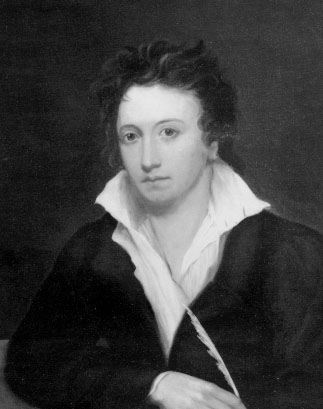 Percy Bysshe Shelley
Percy Bysshe Shelley
In March of 1818, threatened with debtors’ prison and the loss of custody over their children, Percy and Mary Shelley expatriated to Italy. Below, Shelley writes to friend, sometimes-dependent, and founding editor of the Examiner, Leigh Hunt, about Boccaccio, and Mary’s severe depression (stemming from the death of both of their children in the preceding year) and new pregnancy.
TO LEIGH HUNT
September 27th, 1819, Livorno
My Dear Friend,
We are now on the point of leaving this place for Florence, where we have taken pleasant apartments for six months, which brings us to the 1st of April, the season at which new flowers and new thoughts spring forth upon the earth and in the mind. What is then our destination is yet undecided. I have not seen Florence, except as one sees the outside of the streets; but its physiognomy indicates it to be a city which, though the ghost of a republic, yet possesses most amiable qualities. I wish you could meet us there in the spring, and we would try to muster up a “lièta brigata,” which, leaving behind them the pestilence of remembered misfortunes, might act over again the pleasures of the Interlocutors in Boccaccio. I have been lately reading this most divine writer. He is, in a high sense of the word, a poet, and his language has the rhythm and harmony of verse. I think him not equal certainly to Dante or Petrarch, but far superior to Tasso and Ariosto, the children of a later and of a colder day. I consider the three first as the productions of the vigour of the infancy of a new nation—as rivulets from the same spring as that which fed the greatness of the Republics of Florence and Pisa, and which checked the influence of the German emperors; and from which, through obscurer channels, Raffaele and Michael Angelo drew the light and the harmony of their inspiration. When the second-rate poets of Italy wrote, the corrupting blight of tyranny was already hanging on every bud of genius. Energy, and simplicity, and unity of idea, were no more. In vain do we seek in the finest passages of Ariosto and Tasso, any expression which at all approaches in this respect to those of Dante and Petrarch.
How much do I admire Boccaccio! What descriptions of nature are those in his little introductions to every new day! It is the morning of life stripped of that mist of familiarity which makes it obscure to us. Boccaccio seems to me to have possessed a deep sense of the fair ideal of human life, considered in its social relations. His more serious theories of love agree especially with mine. He often expresses things lightly too, which have serious meanings of a very beautiful kind. He is a moral casuist, the opposite of the Christian, stoical, ready-made, and worldly system of morals. Do you remember one little remark, or rather maxim of his, which might do some good to the common narrow-minded conceptions of love—”Bocca bacciata non perde ventura; anzi rinnuova, come fa la luna?”
We expect Mary to be confined towards the end of October. The birth of a child will probably retrieve her from some part of her present melancholy depression. It would give me much pleasure to know Mr. Lloyd. Do you know, when I was in Cumberland, I got Southey to borrow a copy of Berkeley from him, and I remember observing some pencil notes in it, probably written by Lloyd, which I thought particularly acute. One, especially, struck me as being the assertion of a doctrine, of which even then I had long been persuaded, and on which I had founded much of my persuasions, as regarded the imagined cause of the universe. —”Mind cannot create, it can only perceive.” Ask him if he remembers having written it. Of Lamb you know my opinion, and you can bear witness to the regret which I felt, when I learned that the calumny of an enemy had deprived me of his society whilst in England.—Oilier told me that the Quarterly are going to review me. I suppose it will be a pretty [paper torn] and as I am acquiring a taste for humour and drollery, I confess I am curious to see it. I have sent my Prometheus Unbound to Peacock; if you ask him for it he will show it you. I think it will please you.
Whilst I went to Florence, Mary wrote, but I did not see her letter.—Well, good b’ye. Next Monday I shall write to you from Florence. Love to all.
Most affectionately your friend,
P. B. S.
+
FURTHER READING
For more on Shelley and Hunt, click here.


